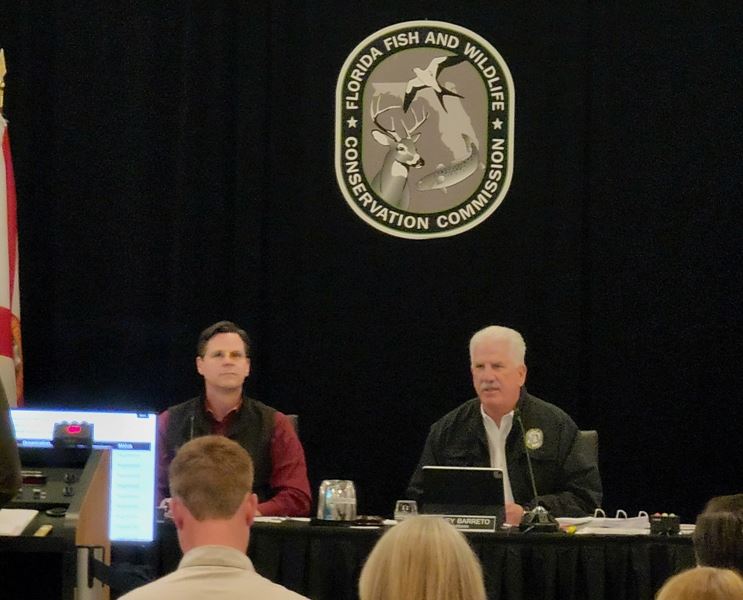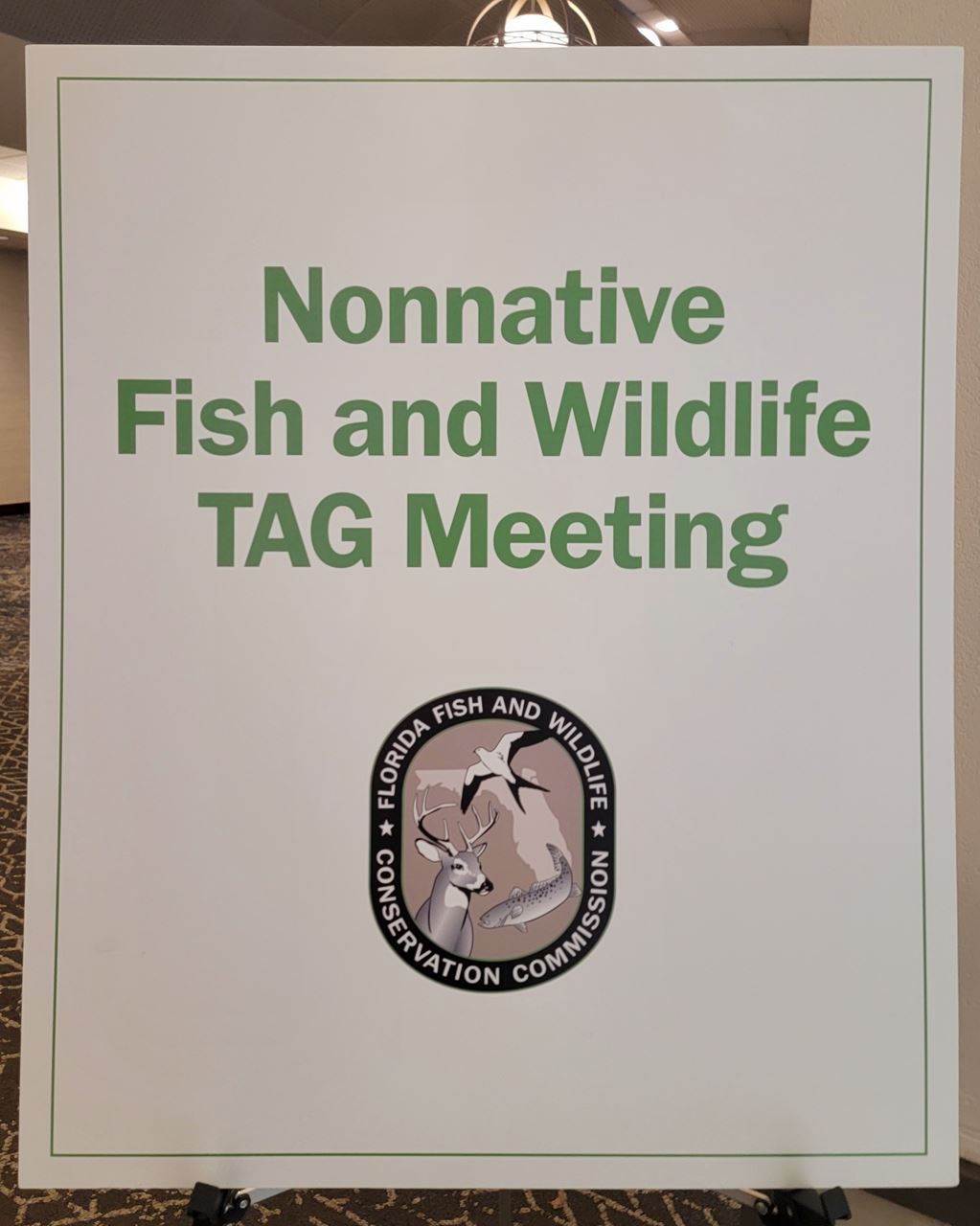
FWC Interim Executive Director Thomas Eason and Chairman Rodney Barreto at the FWC Commission Meeting 2-21-23, Photo by Daniel Parker
FWC Chairman Rodney Barreto's call for immediate action to restrict nonnative species was stunning to pet keepers, small businesses, and farmers who have been working with FWC staff on a "Technical Assistance Group" (TAG) to address nonnative species issues within Florida. At the last TAG meeting on February 9, 2023, FWC Biologist Sarah Funck told the members of the group that they could expect to see a new regulatory framework take shape by the end of the year. In calling for staff to rush to take action by the next Commission meeting in May, FWC Chairman Rodney Barreto has once again chosen to bypass due process and stakeholder input in favor of creating rash, poorly-informed policies.
“I have no qualms about saying that we are shutting down Florida to invasive species,” said Barreto at the FWC Commission meeting on February 21, 2023. The definition of “Invasive Species” was standardized by Executive Order 13112 signed by US President Bill Clinton on February 3, 1999. “Invasive Species” means an alien species whose introduction does or is likely to cause economic or environmental harm or harm to human health. By that definition, very few of the nonnative species that have become established in Florida actually qualify as “Invasive Species.” Before implementing “Prohibited Species” rules in 2021, FWC failed to perform a scientific risk analysis to determine if Green iguanas or Tegu lizards even met the definition of “Invasive,” opting instead for a public relations campaign to demonize the lizards.

A Meeting of the FWC Nonnative Fish and Wildlife TAG was held 2-9-23, Photo by Daniel Parker
The pet industry is heavily regulated within Florida and has been for many decades. Florida has some of the most stringent permitting requirements of any state. Businesses that breed, import, or sell reptiles have to apply for import permits, submit inventories, and maintain receipts documenting sources of all animals, down to the smallest, most inoffensive lizard and tortoise. Strict caging requirements and animal welfare standards are enforced. Burmese pythons have been off limits to pet keepers for over a decade. Chairman Barreto's assertion that we have "open borders" on nonnative species displays not only his ignorance of his own agency's rules, but also prejudice and political opportunism.
Chairman Barreto has been in power at FWC for the better part of two decades. His apparent misunderstanding of the regulations that FWC has already implemented and the amount of data they possess on nonnative species being kept within the state is surprising, given the length of time he has been there. The discussions on “Invasive Species” by the Commissioners at the recent meeting displayed their ignorance on the species they were discussing. The agama lizard that they were treating as a "new problem" has been established in Florida for around a half a century and does not meet the definition of “Invasive.” Sadly, it appears that Chairman Barreto wants to use Florida's pet keepers and small businesses as a political punching bag. FWC has chosen to stir hysteria and ignore science when it has suited their purposes.
FWC’s internal documents have acknowledged that their regulations would hurt small business. The “Notice of Proposed Rule” for rule 68A-6.003, which was passed in May of 2022, said, “The Agency has determined that this will have an adverse impact on small business or likely increase directly or indirectly regulatory costs in excess of $200,000 in the aggregate within one year after the implementation of the rule.” According to reptile keepers, that rule does not give them the same due process and private property rights as other small businesses in Florida.
FWC's “Prohibited Species” rules have already damaged many small businesses and hurt families with cherished pets and companion animals. Many animals have been confiscated and needlessly euthanized by FWC. Moreover, these restrictive rules have done nothing to reduce the Burmese python population in the Everglades, Green iguanas in South Florida, or Tegu populations where they exist. In fact, just as animal industry experts predicted, all of these populations continue to grow under these regulations.

Baby Green Iguana from Broward County, FL- Photo by Daniel Parker
Green iguanas were first reported in Florida around 70 years ago. There is no conclusive evidence linking their introduction to the pet industry. In fact, many have speculated that they were transported on cargo ships bound for Florida from Latin America. These vegetarian lizards have established themselves throughout much of coastal South Florida, especially in heavily developed areas, but are very cold sensitive and unable to survive even subtropical winters further north in Florida.
Up until FWC passed “Prohibited Species” rules three years ago, collectors and small businesses were removing and exporting around one million live iguanas from Florida per year. Since FWC's ill-conceived rules were implemented, most of that wild collection and export has ceased, and the wild iguana population in South Florida has exploded. FWC's statements encouraging citizens to kill iguanas have led to numerous conflicts and injuries to people as well as animal abuse. Public backlash against the FWC iguana killing spree has led to iguanas being treated as a protected species in Miami-Dade County. Miami-Dade County Parks and Recreation biologist Jennifer Stern has told iguana collectors that they may not remove iguanas from parks or even sidewalks within the county.
Combined, Florida's reptile and tropical fish industries generate at least $500 million annually within Florida. These industries provide jobs for thousands of people. Fish keeper and member of the Florida Tropical Fish Farmers Association (FTFFA) Joe Hiduke said, "There is no practical way to evaluate all of the species of fish in the trade (let alone mollusks, crustaceans, reptiles, birds, etc). Hobbyists are terrified that we'll end up with a list of allowed species that only includes the most basic types that are traded in high volume. This essentially eliminates the hobby from the state that has been at the forefront of raising ornamental fish for decades.”
Florida’s reptile keepers believe that the actions of FWC have threatened their ability to continue to operate as small businesses. In 2022, President of the United States Association of Reptile Keepers Florida (USARK Florida), Elizabeth Wisneski, wrote a letter to Governor Ron DeSantis asking him to protect the small businesses of reptile keepers. “Our businesses are threatened by regulations being imposed by the Florida Fish and Wildlife Conservation Commission (FWC). Conservatively, the reptile industry in Florida generates at least $225 million annually, and we are an industry comprised entirely of small businesses,” said Wisneski. “We contribute significantly to the economy of the state and we rely on the incomes of our businesses to support our families and our employees.” She asked that Governor DeSantis, “stand up for our small businesses, as you have for other businesses in Florida.”
By continuing to ignore the input of Florida's farmers and small businesses in the creation of sensible regulations, Chairman Barreto and FWC are ensuring that the Commission's policies will continue to be not only unpopular, but ineffective. As an appointee of a Governor who is a defender of small business and against shut downs, Chairman Barreto's insistence on shut downs and policies that hurt small business is surprising. These poorly thought out policies are resulting in the deaths of many animals and are doing very little to actually address the issue of invasive species in a meaningful way.
A Change.org petition asking Governor Ron DeSantis to address stakeholder complaints and reign in the Florida Fish and Wildlife Conservation Commission (FWC) has received around 18,000 signatures. The petition has garnered widespread support from keepers of fish, reptiles, amphibians, birds, mammals, and invertebrates. See the petition here:
https://www.change.org/p/fwc-mandates-threaten-pet-owners-and-small-business-fl-animal-owners-ask-gov-to-intervene?redirect=false
For more information on this topic, or to schedule an interview, please call 863-441-5067 or email media@usarkfl.net. Media outlets are given permission by Daniel Parker to print the photos contained in this press release.